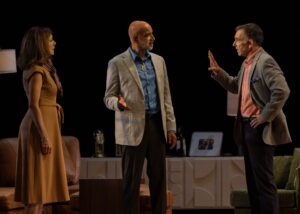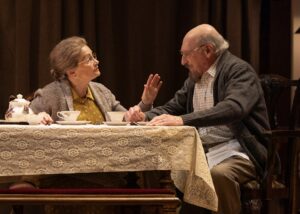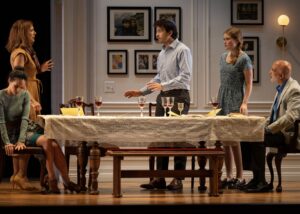SALT LAKE CITY — One of the profoundest moments of my time in grad school was being invited to worship with a Jewish member of my cohort. Having regularly attended worship services of my own faith across the country throughout my life, it was jarring to me to walk into a synagogue where heavily armed guards stood outside the doors. Unfortunately, this precaution has never felt extreme for many real people and this extends to the characters in Joshua Harmon’s Prayer for the French Republic. Seeing the opening night of this three-time Drama Desk-winning character drama had a deeply thought-provoking impact on me during and after the performance.
The story covers two time periods of a family of French Jews living through times of terror. The first time period is post-WWII France where two elderly grandparents, Irma and Adolphe Solomon, welcome home their deeply scarred son (Lucien) and grandson (Pierre) who survived concentration camps. The second time period is near modern day in the months between the 2016 USA presidential election and France’s 2017 runoff between Macon and Le Pen. The character that spans both time periods is Pierre Solomon, the fifth generation of a family who owns a piano store in Paris. The story is narrated by his modern day descendant Patrick Solomon. Patrick’s sister, Marcelle Benhamou, and her family are at the center of the story’s modern conflicts and major dramatic questions about identity, expression of religion and culture, and living with fear. The play is three acts, and is a potent blend of witty banter, poignant character drama, and questions both present and unspoken about the fear of being attacked for who you are to your very core.

Karen Azenberg delivers twice on this show; first in her role as artistic director simply putting it on the season. The show ran on Broadway earlier this year with its run extended twice, and the show is a potent conversation piece heading into election week in the United States. The show explores struggles against anti-semitism on the political left and right, as well as more personal conversations about where the personal ends and the political begins. Prayer For the French Republic features characters with nuanced views of personal identity, expressions of faith, and cultural and heritage markers. It was a strong selection for the season making its Utah Premiere.
Secondly, Azenberg also delivers exceptional direction for the show. While the show’s text, characters, and themes are distinctly Jewish, it is easy to see parallels to other identities, religions, cultures, and familial conflicts. The arguments of the Solomon and Benhumou families could be any family in those situations. Line deliveries often carried many layers of subtext. Molly, played by University of Utah senior BFA student Maggie Goble, embodied well the American atheist perspective, self-assured of understanding the nuances of the family because of their education. While the audience may be more represented by Molly, Azenberg’s direction invites all into the story to feel poignantly the challenges of the play’s characters. I also loved how well she hung lanterns on specific lines of dialogue, props and plot elements that popped up between time periods. These include the trivial such as croissants and vocal inflections of the characters, to weightier matters of family heritages to continue or discard.

The play was exceptionally acted. Jayne Luke (Irma) was hilarious and sweet in her portrayal of a grandmother whose doting affection struggles to grasp the horrors her family experienced. Luke also dropped one of the sweetest sounding, and most humorous, F-bombs I’ve heard on stage. Luke’s chemistry with Joel Leffert, who plays Adolphe in post-WWII times and the aged Pierre in the modern day, was idyllic. There’s a sequence where the grandparents, Irma and Adolphe, have been hidden and sequestered during the Nazi occupation of France. Irma keeps fabricating details of stories about what must have happened to her lost children. She is desperate for Adolphe to engage, and eventually, he does, giving her his own imaginings. It is a sweet scene showing hope in the darkest of moments.
Kim Taff’s portrayal of Elodie was electric. Elodie’s hilarious, lengthy monologue at Molly was a deeply Millenial sounding diatribe. Taff elevated the character as each, “and this is my real point” that sank Elodie deeper into the rabbit holes and echo chambers of the character’s thoughts. Taff played well the sullen daughter who knows too well her own struggles, but finds that the power of knowledge fails to be enough to fix problems internal or external. Taff’s ability to go from zero to sixty and back again at a moment’s notice was fantastic work. I was impressed at the different aspects of the character, and Taff conveying Elodie’s unspoken emotional journey from before the play began through the final scene.
Japhet Balban’s presentation of Daniel was exceptional as the opposition to his sister. Balban played Daniel’s outwardly self-effacing nature heavily to mask the stubbornness and insecurity that underpins his character. Balban’s reactions to being in pain, feeling anguish, and having romantic tension with Molly were all softer than his counterparts, but played well to the character.
I was particularly struck by Judith Lightfoot Clarke who plays Marcelle, mother to Daniel and Elodie. The character is a profoundly respected doctor in her community, and loses that power with her own children who she has spent decades going the rounds with. Clarke plays the grounded character in the middle who sees her family swirling around her as she seeks desperately to cling to normalcy. Seeing her react to the murder of another respected Jewish doctor near her was a moving example of showing and not telling the question, “if her, why not me, too?”

This was less complex, though exquisite design from the creative team at Pioneer Theatre Company. Lighting Designer José Santiago used light to make people appear out of thin air, which fed into the play’s time switches, as well as its sometimes heavier themes. There was also a simple, but well used LED light chain that lit up in the colors of the French flag during the actual “Prayer for the French Republic”. The sound design in that moment from Joe Payne was exceptional, as it sounded like the prayer was coming from all around, even from other patrons. I loved the vaulted ceiling in the set design by Bryce Cutler that made it appear that the top of the set went up forever, and Cutler incorporated clever doors and sliding walls to change locales in the unit set. The set was well-dressed and the space was utilized well for many playing spaces. Costuming from Susan Branch Towne cleanly showed the passage of time and transition between time periods, and Tami Lee Thompson’s hair and make-up design was especially effective with Daniel and Elodie. Daniel is badly beaten at the beginning of the play and recovers slowly throughout with subtle makeup changes. Elodie (who goes from scrounging in the house to out on the town and back) had makeup which helped articulate the inner life of the depressed or energized versions of herself.
Theatremaker Berthold Brecht was famous for seeking to alienate the audience. Brecht wanted to remind them that while they were seeing a story on stage, it was not a place to escape reality, but rather to ruminate and have dialogue about the society in which we live. Azenberg mentions in her director’s note that, “it is the question of what to do when you don’t feel safe that drew me to this play. This is not just a play of, or for, Jewish people.” Prayer for the French Republic was excellent art, but it might be even more exceptional food for thought in 2024. This is a year in which there are still fewer Jews globally than there were in 1939, and there is war in Israel. The play leaves with few conclusions, but is a feast for the soul. With its length, heavy intellectual themes, character-driven story, and a healthy dose of profanity, the show is best aimed at those with a certain level of critical thinking and global context. But to such viewers with a taste for thoughtful performance, I simply say, bon appétit.
[box] Prayer for the French Republic by Joshua Harmon plays Monday thru Thursdays at 7pm and Friday-Saturday at 7:30pm. The run concludes November 9, 2024 and plays at the Simmons Pioneer Memorial Theatre (300 South 1400 East, Salt Lake City). Tickets are $44-57. For more information, visit https://pioneertheatre.org/ [/box]
